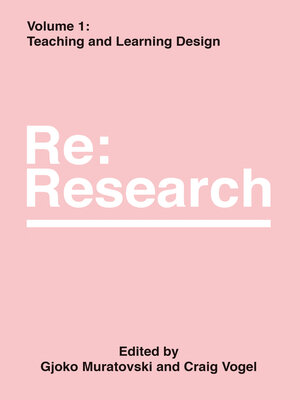Philosophical Frameworks and Design Processes
ebook ∣ Re: Research, Volume 2 · Re:research
By Gjoko Muratovski

Sign up to save your library
With an OverDrive account, you can save your favorite libraries for at-a-glance information about availability. Find out more about OverDrive accounts.
Find this title in Libby, the library reading app by OverDrive.



Search for a digital library with this title
Title found at these libraries:
| Library Name | Distance |
|---|---|
| Loading... |
Just as the term design has been going through change, growth and expansion of meaning, and interpretation in practice and education – the same can be said for design research. The traditional boundaries of design are dissolving and connections are being established with other fields at an exponential rate. Based on the proceedings from the IASDR 2017 Conference, Re:Research is an edited collection that showcases a curated selection of 83 papers – just over half of the works presented at the conference. With topics ranging from the introduction of design in the primary education sector to designing information for Artificial Intelligence systems, this book collection demonstrates the diverse perspectives of design and design research. Divided into seven thematic volumes, this collection maps out where the field of design research is now.
Two Blind Spots in Design Thinking
From the 1980s, design thinking has emerged in companies as a method for practical and creative problem solving, based on designers' way of thinking, integrated into a rational and iterative model to accompany the process. In companies, design thinking helped valuing creative teamwork, though not necessarily professional designers' expertise. By pointing out two blind spots in design thinking models, as currently understood and implemented, this paper aims at shedding light on two rarely described traits of designers' self. The first relies in problem framing, a breaking point that deeply escapes determinism. The second blind spot questions the post project process. We thus seek to portray designers' singularity, in order to stimulate critical reflection and encourage the opening-up to design culture. Companies and organizations willing to make the most of designers' expertise would gain acknowledging their critical heteronomy to foster innovation based on strong and disruptive visions, beyond an out-of-date problem-solving approach to design.
Creating Different Modes of Existence: Toward an Ontological Ethics of Design
This paper will address some design concerns relating to philosopher Étienne Souriau's work Les différents modes d'existence (2009). This has important bearings upon design because, first, this philosophical attitude thinks of designing not as an act of forming objects with identity and meaning, but rather as a process of delivering things that allow for a multiplicity of creative remodulation of our very existences. Secondly, Souriau unpicks the concept of a being existing as a unified identity and redefines existence as a creative act of nonstop production of a variety of modes of existence. In doing this he not only moves ontological considerations to the fore of philosophical discussions away from epistemological ones, but does so in such a way as to align with attitudes to ethics that relate it to ontology – notably the work of Spinoza. (This places Souriau in a philosophical lineage that leads back, for example, to Nietzsche and Whitehead, and forward [from his era] to Deleuze and Guattari.) In thinking both ontology and ethics together, this paper will introduce a different approach to the ethics of design.
Investigating Ideation Flexibility through Incremental to Radical Heuristics
The concept of design thinking has received increasing attention during recent years, particularly from managers around the world. However, despite being the subject of a vast number of articles and books stating its importance, the effectiveness...







